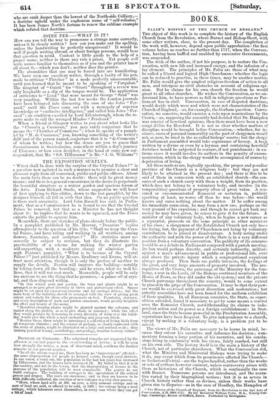JOTEE PER—WHIT IS IT?
How can you tell the way to pronounce a strange name correctly, unless it be clearly written ? how can you make out the spelling, unless the handwriting be perfectly unectuivocal? It would be well if people writing abroad, or about foreign persons, would bear that question in mind. Context is little guide to the help of a proper name, neither is there any rule a priori. Yet people will write names familiar to themselves as if you and the printer knew all about it,—which you don't ; neither does the printer. The absurdities that one may be forced into are humiliating. We have seen one excellent writer, through a laxity of his pen, made to criticize " Fletcher " in a mode perfectly unaccountable, until you learned that he meant to be speaking of "Farquhar." The misprint of " Guisti " for "Giusti" throughout a review was only laughable as a slip of the tongue would be. The application of criticisms to " Laud " that were meant for George "Sand" was very puzzling. Within the last few weeks the London journals have been betrayed into discussing the case of one Jotee "Per- sand," until the Times came out with a monopoly of superior knowledge or "exclusive intelligence," and called him jotee "Per- saud "; an erudition excelled by Lord Ellenborough, whom the re- ports make to call the wronged Hindoo " Pershaud."
When a friend at Glasgow writes to you about what looks like the " Cluuulu g Cummuu," you may safely conjecture that he means the " Chamber of Commerce " ; when he speaks of a pamph- let by "M. de Cuuuuuu," you, knowing something of the writer's drift and of the person named, conjecture that it is "de Cormenin " of whom he writes ; but how the deuce are you to guess that Stnmuluuuuu is Searicalasino, somewhere within a day's journey of Florence ; or how even decipher, in the hand of some new cor- respondent, that Mr. " S.S. TIMmmmn." is Mr. "J. G. Williams"?


























 Previous page
Previous page